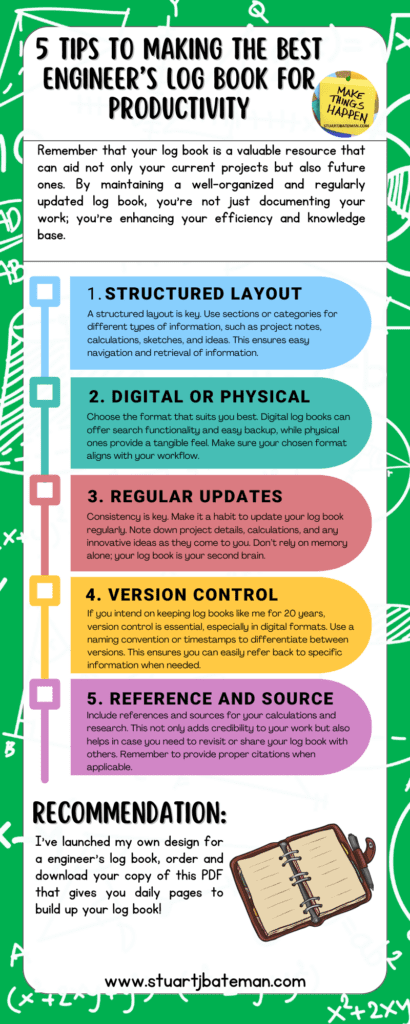Optimizing Excellence: 5 Tips for Maintaining a Engineering Log Book
If you don’t love something you won’t go the extra mile – Steve Jobs

An Engineering log book – If you’re interested in purchasing my log book PDF check it out here.
One of the tools I rely on the most as an engineer is my engineering log book, it’s more that just a book full of notes, it’s my calculator / research tool/ idea generator / second brain and when needed it’s my portable CAD.
I’ve been keeping a log book for 20 years and they’ve evolved from a A5 note pad to the digital (printed PDF of my own design) version.
To this day I still have them all as there is a huge amount of information and ideas from past projects that I use today.
But like most people, I was inspired by others who had impeccable examples of what I wanted my log book to look like, my colleague at Stannah inspired me with a great example, his log books being so well laid out and organised gave me the motivation to do so with mine.
Why should you keep a log book as an engineer?
With the amount of information that’s available to us today, you will quickly be overwhelmed with having to keep everything in your head. We’re just not made for the information age as humans, we evolved only needing to know what was food and what we had to run from!
So, with all this information we need ways to filter and manage what’s important to us and our role, thus there are many note taking methods like Cornel’s one here, and that are even versions of managing online notes like the PARA method here.
Having a engineering log book enables engineers not just to take notes from meetings but to sketch out concept ideas and basic formulas for the projects we’re working on, and yes today we have tablets that allow us to digitise that information for faster file sorting, but don’t knock the pencil and paper approach at least that will still work when you have to charge your iPad.
Let’s get into the benefits then for a engineering log book:
- Improves Organisation
- Have a log book and maintaining a method of taking notes allows you to be more organised overall, in your presentation, work and thoughts.
- Encourages active engagement
- The act of taking notes, means you’re translating information you’ve just absorbed and turning into your own notes i.e. in your own words, the act itself is a recall which starts to help our memory and understanding.
- Boosts retention
- As I stated above, by recalling the information and rewriting it in our notes in our own words we are started to bed in the learning and putting the details into memory.
- Support efficient review
- Depending on how well you develop your organising of your notes will depend on how efficient they are when you come to review them later, but don’t fret if you can’t understand your notes, you just need to practise to find the right method for you (I use the Eisenhower method)
- Clarifies complex information
- By breaking down meeting, seminars, online courses or just the day to day business, you give yourself the chance to write things down and breaking up the information into ‘Chunk’ that are easier to digest and understand, be careful though re-read those chunk to see if they make sense by themselves.
Get into the practise of writing a daily engineering log book, you’ll be surprised how quickly these benefits start to show themselves.
TIPS
So, here are my 5 tips that I’ve learned and used over the last 20 years:
- Structured Layout: A structured layout is key. Use sections or categories for different types of information, such as project notes, calculations, sketches, and ideas. This ensures easy navigation and retrieval of information.
- Digital or Physical: Choose the format that suits you best. Digital log books can offer search functionality and easy backup, while physical ones provide a tangible feel. Make sure your chosen format aligns with your workflow.
- Regular Updates: Consistency is key. Make it a habit to update your log book regularly. Note down project details, calculations, and any innovative ideas as they come to you. Don’t rely on memory alone; your log book is your second brain.
- Version Control: If you intend on keeping log books like me for 20 years, version control is essential, especially in digital formats. Use a naming convention or timestamps to differentiate between versions. This ensures you can easily refer back to specific information when needed.
- Reference and Source: Include references and sources for your calculations and research. This not only adds credibility to your work but also helps in case you need to revisit or share your log book with others. Remember to provide proper citations when applicable.
Rule!
Remember that your engineering log book is a valuable resource that can aid not only your current projects but also future ones. By maintaining a well-organized and regularly updated log book, you’re not just documenting your work; you’re enhancing your efficiency and knowledge base.




What are your thoughts? Have I covered everything or is there more you know and would like to share?
I’m always learning and improving this site and my blogs, so please feel free to get in touch with me via LinkedIn or this site to discuss any topics I have covered.
If you’re having trouble finding ways to progress check out these sites filled with free learning tools:

